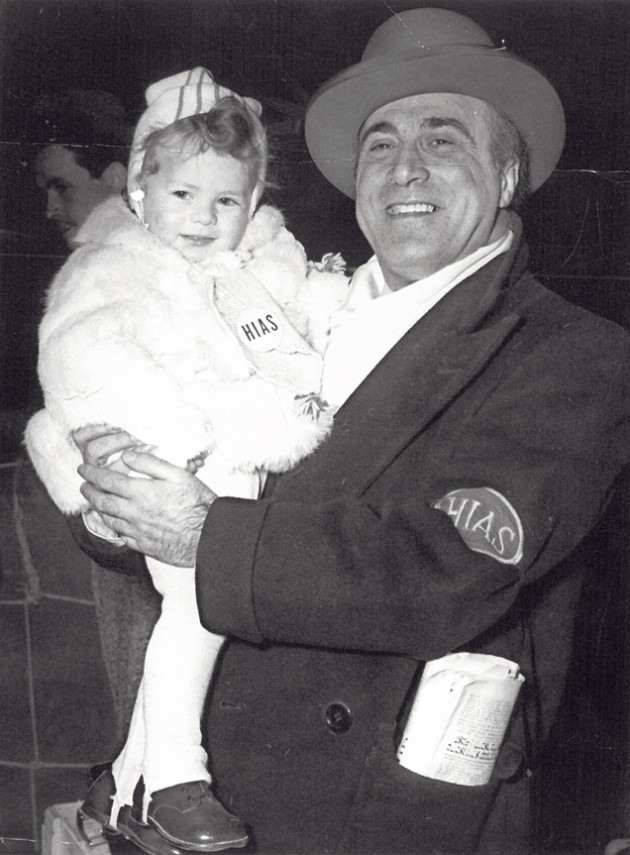דער פֿאָרווערטס דרוקט אַ פֿאָטאָגראַפֿיע פֿון מײַן ברודער מאָטל
The Forverts Publishes a Photo of My Brother, Motl

פֿון וויסקאָנסין), סטיווען ראָסעק (מילוואָקי
Scroll down for English
(דאָס איז טייל פֿון אַ סעריע פֿאָרווערטס־זכרונות פֿון אונדזערע לייענער, וואָס זענען אָפּגעדרוקט געוואָרן אינעם סאַמע לעצטן געדרוקטן נומער, אַפּריל 2019)
איך בין דערצויגן געוואָרן בײַ אַ ייִדיש־רעדנדיקער משפּחה אין סיגייט, ברוקלין. אין יענע יאָרן האָבן אַ סך אײַנוווינער פֿון דער געגנט גערעדט ייִדיש.
די מאַמע איז געווען אַ לעבן געבליבענע פֿון בירקענאַו, און דער טאַטע — אַ וועטעראַן פֿון דער סאָוועטישער אַרמיי.
אינעם טאָג ווען זיי זענען אָנגעקומען קיין אַמעריקע, אין 1949, האָט דער פֿאָרווערטס אָפּגעדרוקט אַ פֿאָטאָגראַפֿיע פֿון מײַן ברודער מײַקל, וועמען מע האָט דעמאָלט גערופֿן מאָטל, אין די אָרעמס פֿון אונדזער עלטער־פֿעטער, דעם באַקאַנטן ייִדישן אַקטיאָר הערמאַן יאַבלאָקאָף. איך אַליין בין געבוירן געוואָרן מיט נײַן יאָר שפּעטער.
דער פֿאָרווערטס איז תּמיד געלעגן בײַ אונדז אין דער היים, פּונקט ווי די ניו־יאָרק טײַמס איז געלעגן אויף די טישן און סאָפֿעס בײַ מײַנע פֿרײַנד, וואָס האָבן נישט געהאַט קיין „גרינע‟ עלטערן. נאָך דעם ווי איך האָב זיך אויסגעלערנט דעם אַלף־בית אין דער תּלמוד־תּורה האָב איך געפּרוּווט דעשיפֿרירן די ווערטער אינעם פֿאָרווערטס. מײַנע עלטערן האָבן דאָס באַמערקט און מיר געוויזן ווי אַזוי אַרויסצורעדן די ייִדישע וואָקאַלן. מיט דער הילף פֿון דער מאַמען, דאָראַ ז״ל, און דעם טאַטן, שמעון ז״ל, האָב איך מיט דער צײַט געקענט איבערלייענען קורצע אַרטיקלען.
דער פֿאָרווערטס איז געווען אַ פֿענצטער אין דער וועלט פֿון מײַנע טאַטע־מאַמע… אויף זייער מאַמע־לשון. איך האָב דעמאָלט נישט פֿאַרשטאַנען אַז די צײַטונג האָט זיי סײַ פֿאַרבונדן מיטן נעכטן סײַ זיי אינפֿאָרמירט וועגן דעם הײַנט. אַז אַ מענטש לעבט איבער אַזאַ איבערקערעניש אין לעבן איז נייטיק צו בלײַבן פֿאַרבונדן מיט דער וועלט.
The Forverts Publishes a Photo of My Brother, Motl Steven Russek (Milwaukee, Wisconsin)
Part of a series of Forverts memories by our readers, published in the very last paper edition of the Forverts, April 2019
I grew up in a Yiddish-speaking home in Sea Gate, Brooklyn, surrounded by many other Yiddish speakers in the community. My parents came to the US after the Shoah. My mom was a survivor of Birkenau and my Dad was a veteran of the Soviet Army.
On the day of their arrival to the US in 1949, a photo of my brother Michael, who was called Motl then, appeared in the Forverts. He was held by our great-uncle, the well-known Yiddish actor Herman Yablokoff. I was born some nine years later.
The Forverts was ever present in our home, in the same way that the New York Times lay on the tables and couches at the homes of my friends, those who didn’t have “greene” parents. After I mastered the alef-beyz in Hebrew School I tried to make sense of the writing on the pages of the Forverts. My parents noted my interest and explained how to use the Hebrew characters and vowel structure to sound out words. With the help of my Mom Dora z”l and Dad Shimon z”l I eventually was able to read short articles. The Forverts was a window into the world for my folks …. in their mama loshn. I did not fully appreciate then that it preserved a connection to their past while informing them of their present. When you have survived so much turmoil, you need to stay connected.
Steven Russek
די לעצטע אַרטיקלען
The Yiddish Daily Forward welcomes reader comments in order to promote thoughtful discussion on issues of importance to the Jewish community. In the interest of maintaining a civil forum, The Yiddish Daily Forwardrequires that all commenters be appropriately respectful toward our writers, other commenters and the subjects of the articles. Vigorous debate and reasoned critique are welcome; name-calling and personal invective are not. While we generally do not seek to edit or actively moderate comments, our spam filter prevents most links and certain key words from being posted and The Yiddish Daily Forward reserves the right to remove comments for any reason.





